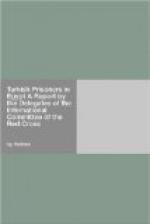Bedding.—Each prisoner lies on a mat of plaited rush, and has four blankets. Every morning the mats are brushed and rolled up and the blankets folded, so that during the day there is a large clear space inside the building. The detention cells have the same sleeping accommodation.
Exercise.—The space left between the barracks of the separate sections is amply sufficient for exercise, which is quite unrestricted during the regulation hours.
Food.—Provisions are purchased by the commissariat and brought every morning into a special barrack, whence each section draws its daily rations. Bread comes from the Cairo bakeries. It is of good quality and agreeable to the taste. The kitchens are in the open and heated by wood fires. They are staffed by a detachment of prisoners under a head cook. At meal times each section sends men to draw the rations for each room in large metal bowls. Every man has his own spoon, bowl and drinking cup, all of metal. The hours of meals are ordinarily as follows:
5 a.m.; 11 a.m.; and 4 p.m.
The last meal is the principal one of the day.
We have examined the various food materials given the prisoners and found them to be of excellent quality.
The menu of the Turkish prisoners of war now interned in Heliopolis Camp consists of bread, meat, vegetables, rice, butter, pepper, salt, onions, tea (7-1/2 grammes), sugar (42 grammes), cheese and jam or olives.
Each prisoner receives 42-1/2 grammes of cigarettes and two boxes of matches every week; two lbs. of firewood per day; and soap.
It interested us to make a note of the expenses involved by the support of each Turkish prisoner, according to figures supplied by the English authorities.
The calculation is based on a period of six months (in winter).
L
s. d.
Clothing and linen 3
0 0
Periodical renovation of winter
clothes
0 6 6
Renovation of linen, footwear,
and towels (twice)
1 10 0
Food at actual contract prices 5
0 0
Tobacco 0
12 6
Wood (average price) 0
7 6
Lighting (as for Maadi Camp) 0
2 0
Water filtration (Maadi) 0
0 6
-------------
Total L10
19 0
=============




